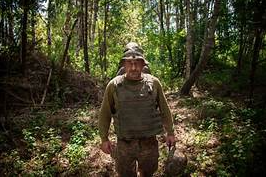We don’t know when this war will end – but we can begin to see how.
Ukraine’s recent cross-border offensive into Russia’s Kursk region marks a dramatic shift in the course of a war that had previously been characterized by slow, grinding attrition. This move, while risky, could potentially disrupt Russian military positioning, forcing them to reallocate troops away from critical frontlines in Ukraine. If successful, this strategy could serve as a powerful bargaining chip for Ukraine in future peace negotiations, though its ultimate effectiveness remains unclear.
Despite this, the military realities on the ground make it difficult to imagine Ukraine regaining substantial territory currently held by Russia. Similarly, it is unlikely that Russia will extend its territorial gains beyond minor, strategically insignificant areas. Both sides seem locked in a stalemate, unable to secure major victories or advances.
The offensive into Russian territory, though notable for its boldness, has undoubtedly provided a morale boost for Ukraine. It has generated some much-needed positive headlines and offered a rare victory in a conflict that has largely been defined by frustration and prolonged suffering. However, it is important to recognize that individual military actions like these are not enough to bring the war to a conclusion.
The real challenge lies in sustaining international support for Ukraine, particularly as the war stretches into its third year. In key Western allies like the US and Germany, there is growing concern about the long-term viability of continuing the current level of aid and military support. Over time, the fatigue of war and the lack of significant progress on the battlefield may erode the enthusiasm for sustaining the conflict.
The situation is further complicated by the political dynamics of Western nations, where public opinion is starting to shift. As the war stagnates, and with no decisive breakthroughs in sight, skepticism is on the rise. Even within the US and Europe, which have been major supporters of Ukraine, there are growing calls for a reevaluation of strategy and an increasing desire to bring the conflict to an end.
As the war continues with no clear end in sight, the desire for resolution is intensifying across the globe. While supporters of Vladimir Putin may hope for a victory, broader segments of the public, including those in the West, are becoming weary of the ongoing conflict. The urgency to find a resolution is growing, especially as the toll of the war becomes ever more apparent.
Ultimately, unless there is a genuine military breakthrough from either side, the pressure for peace negotiations will only increase. Without decisive military action or an immediate shift in the war’s dynamics, Ukraine and its allies may be forced to grapple with the difficult reality that, even with support, achieving lasting victory in this conflict will require patience and potentially painful compromises.

